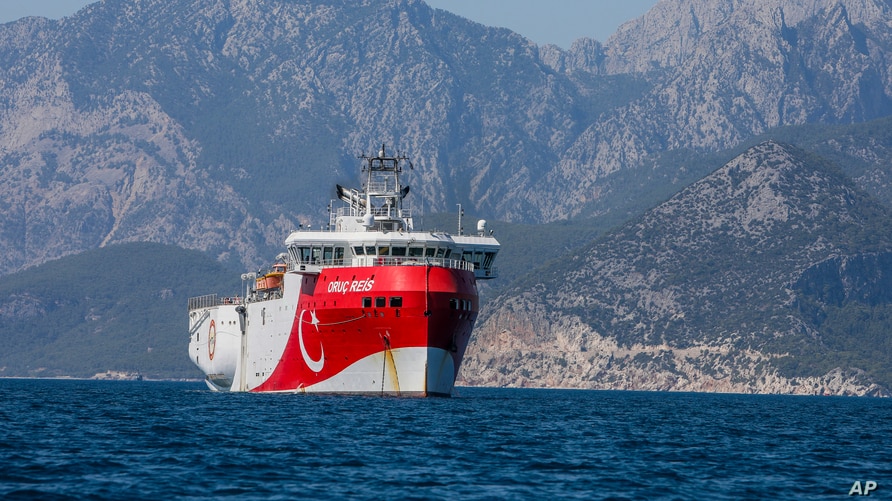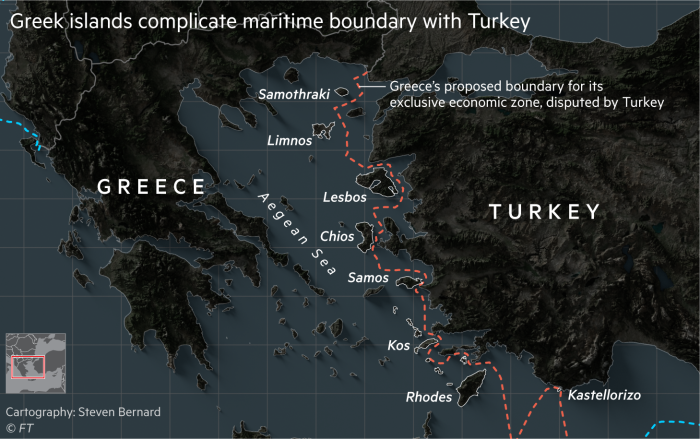by Rafaella Piyioti

Over the past decade, discoveries of large amounts of natural gas in the Levant Basin as well as in the territorial waters of Israel and Cyprus show that the area is rich in resources. Their successful exploitation potentially holds enormous economic benefits. For this reason, a strong alliance between Cyprus, Israel, Greece, and Egypt led to the signing of maritime boundary agreements, establishing an Exclusive Economic Zone (EEZ) for each country. The presence of these resources, however, also presents a challenge for regional stability. Turkey, for example, is left excluded from this initiative. As a result, tensions in the Eastern Mediterranean are growing. The roots of this dispute over energy resources, nevertheless, is part of the conflictual histories of the actors involved, thus holding wider implications for the international community.
In January 2020, Cyprus, Greece, Israel, Egypt, the Palestinian Authority, and Jordan formed the EastMed Gas Forum to establish the basis for cooperation and exploration of the natural resources in the Eastern Mediterranean. France made an official membership request while the US asked to become a permanent observer of the forum. At the same time, Turkey officially criticised the forum as an organised attempt to exclude Ankara. Part of the reason why, however, is that Turkey did not sign the UN Convention on the Law of the Sea. According to the UNCLOS, the territorial waters of a nation extend up to 12 nautical miles from its shore and up to 200 nautical miles from the shore of its EEZ. Natural resources found within this territory belong exclusively to that country. Contrary to UNCLOS, Turkey formed its own continental shelf theory, which excludes islands, and states that a country’s EEZ extends underwater only to the very edge of its continental shelf. The absence of formal agreements between Turkey, Greece, and Cyprus on their maritime borders, leads to competing claims on the extension of their territorial rights at sea made by Cyprus and Greece, and Turkey and Northern Cyprus.

With Northern Cyprus under Turkish control since the 1974 invasion, Turkey officially does not recognise the Cypriot Republic to the South. As such, President Recep Tayyip Erdoğan rejects any Cypriot drilling activities in the region and refuses to recognise Cyprus’ agreements with Israel, Greece, and Egypt over the exploitation of natural resources found in the Eastern Mediterranean. Instead, Turkey considers the maritime territory of Northern Cyprus to be part of its EEZ and following its own continental shelf theory the exploitation of hydrocarbons found in the region is a Turkish legal right. Northern Cyprus, however, is not recognised by any country other than Turkey itself and Erdoğan’s actions are deemed illegal by the international community.
More recently, tensions over the ownership of the natural resources under the seabed of the Mediterranean between Turkey and Cyprus escalated, with Turkey holding military exercises in the Mediterranean. In May 2019, Turkey sent its first drilling ship to conduct exploratory drillings off the north coast of Cyprus. The European Union (EU), in response, imposed economic sanctions on Turkey. Erdoğan refused to de-escalate tensions stating that European sanctions will not affect Turkey’s determination to continue exercising what it sees as its legal rights in Cypriot waters. At present, two Turkish ships, Yavuz and Barbaros Hayrettin Paşa, are in territorial waters around Cyprus searching for natural resources.
Tensions between Greece and Turkey are more complicated. The two countries find themselves in an ongoing dispute over Kastellorizo, a Greek island located to the east of the Aegean Sea close to Turkey’s Anatolian coast. Greece insists that, according to UNCLOS, the island enjoys a full EEZ of 200 miles leaving Turkey with a very small EEZ relative to its coastline. Turkey rejects Athens’ claims and has continued to conduct drilling south of the island. In response, Greece has attempted to push for additional sanctions against Turkey but there is little appetite for such a response at the European level. German attempts to mediate between Greece and Turkey called for official negotiations, which failed to reach a mutual agreement over the EEZ of Kastellorizo. A maritime-boundary agreement between Greece and Egypt, viewed by Turkey as a move of aggression violating its maritime territory, thereby ending the negotiation process.
Renewed illegal drillings by Turkey in August 2020, this time with the presence of Turkish Navy warships in the area. Greek warships often shadow them creating a tense and potentially escalating situation. As Erdoğan renews his aggressive rhetoric, the Greek PM, Kyriakos Mitsotakis, introduced a new defence plan, increasing the country’s military capabilities. But as Turkey and Greece are NATO allies a push towards a new phase of negotiations seems more appealing than a military confrontation. France condemns Erdoğan’s violations of Greek and Cypriot maritime rights offering military assistance to Greece. Germany attempts to mediate between Greece and Turkey and the rest of the EU is still indecisive.

Turkey’s behaviour in the Eastern Mediterranean is part of Erdoğan’s ‘neo-Ottoman’ foreign policy, which aims at renewing Turkish influence in neighbouring countries, formerly part of the Ottoman empire. With the Turkish lira facing one of its lowest recorded values, the President is attempting to turn people’s attention away from the economic problems, by emphasising Turkish influence in the region. Turkey’s isolation from its NATO allies over their conflicting interests in the Eastern Mediterranean also pushed Erdoğan towards adopting a rather more Islamist tone, promoting himself domestically as the protector of all Muslims. After his long-lasting military presence in Syria since 2011, Erdoğan turned his attention to Libya. Turkey and Libya signed a maritime accord in November 2019 violating the Greek EEZ. To escalate things further Erdoğan sent military aid to the UN-recognised government (GNA) in Tripoli to help Fayez al-Sarraj defeat General Haftar’s Libyan National Army.
Turkey’s involvement in Libya could lead to further destabilisation in the region and draw the involvement of additional international actors. France, Greece, Egypt, Israel, and the UAE publicly backed Haftar, with the latter two signing a historic peace deal. Paradoxically, the U.S. did not take a clear position on Libyan tensions despite its’ close ties with General Haftar who holds U.S. citizenship. Turkey’s recent involvement in the Nagorno-Karabakh conflict is another example of Erdoğan’s assertive foreign policy. Amid recent increases of violence in the region Erdoğan pledged his nation’s support for Azerbaijan. The Azerbaijani forces are using Turkish-made drones in their fight against Armenians. Turkey is growing into a major drone player but the use of Turkish drones in Nagorno-Karabakh received international scrutiny.
Erdoğan envisions Turkey as a regional power and pursues an assertive foreign policy to extend its regional influence. Turkish claims at a sea, as well as its pursuits on land, fall within the scope of its neo-Ottoman vision, which sees Turkey advancing its influence in the region. The EU remains indecisive on how to approach Turkey; Germany acts as the mediator whilst France takes a tougher stance, pledging military support to Greece. Without the U.S. in its traditional, since the 1974 Turkish Invasion in Cyprus, mediating and stabilising role in the region, it is time for the EU to decide on a new approach to handle this crisis. The U.S. under President Donald Trump reduced its foreign involvement and distanced itself from its NATO allies. Under the future President Joe Biden, the USA might wish to think anew of taking up its traditional role in NATO and its presence in the Eastern Mediterranean. Turkey is a strategic partner of the EU but if Erdoğan continues his aggressive behaviour in the Eastern Mediterranean, tensions could escalate further jeopardising the future of EU-Turkey cooperation.
Rafaela is a part-time MA student in the Conflict Resolution in Divided Societies programme at King’s College London. She received her BA in War Studies and Philosophy and is a Staff Writer for Strife Blog, Shield, and writes for a Cypriot newspaper. Currently, she is a Research Analyst for London Politica. Her main academic interest is on the role of intelligence in policymaking. Rafaella also has a passion for Human Rights and has interned at the Cyprus Refugee Council. Rafaella enjoys travelling and learning about new cultures in her free time.
Rafaela is a part-time MA student in the Conflict Resolution in Divided Societies programme at King’s College London. She received her BA in War Studies and Philosophy. She is a Staff Writer for the Shield and writes for a Cypriot newspaper. Currently, she is a Research Analyst for London Politica. Her main academic interest is on the role of intelligence in policymaking. She also has a passion for Human Rights and has interned at the Cyprus Refugee Council. Rafaella enjoys traveling and learning about new cultures in her free time.